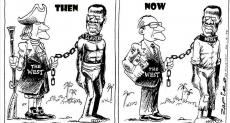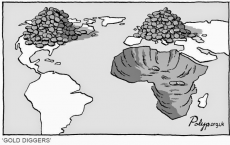
Email: emanuelealbertocirello.98@gmail.com
Total Article : 76
About Me:I am a Year 13 student which aspires to be an architect. I am interested in anything I don't yet know, and I mostly write about art, politics , Italian culture and inspirational people, although I will try to write for as many categories possible, just to test myself and get to know more things.

Neo colonialism is a form of indirect control over developing countries, which were in most cases past colonies. After decolonisation and independence, many leaders argued that they were subject to a new form of colonialism, waged by former colonising powers and other developed nations.
Ghanaian first president Kwame Nkrumah, who believed that neo colonialism was an even worse type of imperialism, firstly used the term neo colonialism to say that “for those who practice it, it means power without responsibility and for those who suffer it, it means exploitation without redress.”
Neo colonialism is most often linked to Africa and is used as an explanation for the lack of development in the continent. Developed countries, on the other hand, tend to point to evidence such as the share of world trade that goes to developing countries and the positive effects of globalisation, in order to argue that neo colonialism has stopped any real developments in the last 40 years since developing countries gained independence.
The way that neocolonialism acts can either be subtle or evident, therefore direct and indirect methods of control are used to strengthen the economic power and political presence of exploitative superpowers.
The main way that superpowers would impose direct control on more vulnerable territories in the past would be through colonialism. They would use war and their superior military power to gain control of these territories to impose their own mechanisms such as legal systems, culture and economics. In the past, this would often be done to fulfil a superpower's own agendas, such as the exploitation of raw materials or cheap labour; however in recent decades there has been a shift towards more political agendas. Many superpowers or major powers now intervene in troublesome regions that they believe may threaten their superpower security. Whilst rare, superpowers do still take full colonial control of some countries in extreme circumstances- for example the NATO led coalition taking control of Afghanistan in 2001.

In recent decades, there has been a shift towards more indirect control. Superpowers now use more subtle, 'roundabout' ways to impose their influence and power on other territories, in essence 'neo-colonial' control. The three main examples of this are aid, trade and debt:
> Aid is often given to allies or 'friends' with whom the superpower wants to create or maintain certain relationships. A lot of aid is, in fact, supposed to be paid back to the country who supplied it. This means countries which receive aid are often in debt to superpowers. Some superpowers use this wisely, offering aid to countries who perhaps have no choice but to accept it, but will in future be able to be manipulated because of their debt to the superpower.
> As previously mentioned, some aid is in fact owed back in the form of a debt to the superpowers that have offered the aid. This channels money from the developing world into the developed world, increasing polarisation between the two. Not only do the economies of the developing and developed world become more polarised, but so does their power. As the developing countries pay money back to the superpowers of the developed world, they become more vulnerable as the superpowers gain more power. This leads to superpowers having a greater power over these vulnerable territories. Debt relief schemes such as the HIPC are often still exerting control over the countries paying back their debt- in order to qualify for the scheme, they must follow certain rules, certain policies of bankers in the developed world.
> The world trade system is essentially a western 'free trade' one. The world's three main stock markets (London, New York and Tokyo) are in the 'west'. Superpowers and other major powers are home to some of the most famous examples of Transnational Corporations (TNCs) - huge companies that operate across global borders. These TNCs themselves can have huge influence over more vulnerable territories; for example some LEDCs relax their trading laws in order to attract TNCs to boost their economy.
Superpowers use trade to maintain their power and dominance. Having the freedom to choose where they import goods from and export goods to can have a massive impact on global economies, and superpowers use this to 'manipulate' other countries to follow certain trade rules or accept certain trade deals which benefit the superpower.
These methods of exploitation and control are a key resource for our society to make capitalism and consumerism thrive and grow. Neocolonialism, to an extent, is vital and has been for a long time; as such it often times overlooked and hypernormalised like many other social, politcal and economic issues that afflict our time. The widening gap among social classes on a national scale and even more on an international scale is a continuous occurrance that is becoming a part of reality. Neocolonialism could perhaps be considered inevitable after the dismantling of formal imperialism, however living in a world where society overlooks such forms of political and economic control is simply not good enough. Governments of superpowers should therefore be held accountable for infringing the many moral codes and human rights resulted by the perpetuation of neocolonialism and ultimately exploitation.
Image credits: http://4.bp.blogspot.com/-KQFretRyJxQ/U5Hx3S4DECI/AAAAAAAANPI/sZXs1dA6Ji4/s1600/cartoon.jpg
https://www.tesfanews.net/wp-content/uploads/2015/12/media-neocolonialism.jpg

0 Comment:
Be the first one to comment on this article.